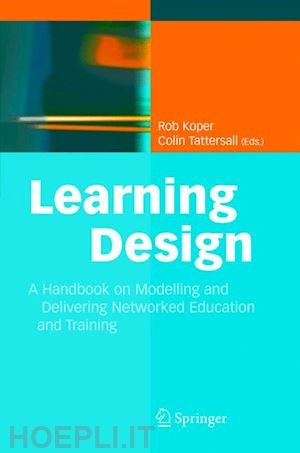
Questo prodotto usufruisce delle SPEDIZIONI GRATIS
selezionando l'opzione Corriere Veloce in fase di ordine.
Pagabile anche con Carta della cultura giovani e del merito, 18App Bonus Cultura e Carta del Docente
E-learning is still in its infancy. This can be seen both in the limited pedagogical quality and lack of portability of e-learning content, and in the lack of user-friendly tools to exploit the opportunities offered by current technologies. To be successful, e-learning must offer effective and attractive courses and programmes to learners, while at the same time providing a pleasant and effective work environment for staff members who have the task to develop course materials, plan the learning processes, provide tutoring, and assess performance.
To overcome these deficiencies, the IMS Global Learning Consortium Inc. released the Learning Design Specification in 2003. With Learning Design it is possible to develop and present advanced, interoperable e-learning courses embracing educational role and game playing methods, problem-based learning, learning community approaches, adaptivity and peer coaching and assessment methods.
In this handbook Koper and Tattersall have put together contributions from members of the "Valkenburg Group", consisting of 33 experts deeply involved in e-learning and more specifically learning design. The result is a rich and lasting source of information for both e-learning course and tool developers, providing information about the specification itself, how to implement it in practice, what tools to use, and what pitfalls to avoid. The book not only reports first experiences, but also goes beyond the current state of the art by looking at future prospects and emerging applications.
Rob Koper is Director of R&D Learning Technologies and member of the Management Team of the Educational Technology Expertise Centre (OTEC) of the Open University of The Netherlands. Results: EML (Educational Modelling Language), IMS Learning Design, models for competency based learning, personalised instruction, web-based learning environments, XML based authoring environments (design, editing, content management), pedagogical meta-models and new generative models for building personalised curricula). Leader of new 5 year programme into Self-Organized Learning Networks.
Colin Tattersall studied Computational Science before working on his PhD at the Computer Based Learning Unit at Leeds University. He subsequently moved to The Netherlands to work for the R&D arm of one of the major Dutch telecommunications operators. There, he investigated new technologies in the area of sales and marketing support systems, publishing several articles and participating in technology dissemination and consultancy exercises. In the mid-nineties, he moved into the software industry, working as Product Manager for a company specializing in (XML-based) support systems for knowledge-intensive processes. In mid 2002 he joined The Open University of The Netherlands as an educational technologist, where his responsibilities cover work related to innovation in e-learning and learning technology standardisation.











Il sito utilizza cookie ed altri strumenti di tracciamento che raccolgono informazioni dal dispositivo dell’utente. Oltre ai cookie tecnici ed analitici aggregati, strettamente necessari per il funzionamento di questo sito web, previo consenso dell’utente possono essere installati cookie di profilazione e marketing e cookie dei social media. Cliccando su “Accetto tutti i cookie” saranno attivate tutte le categorie di cookie. Per accettare solo deterninate categorie di cookie, cliccare invece su “Impostazioni cookie”. Chiudendo il banner o continuando a navigare saranno installati solo cookie tecnici. Per maggiori dettagli, consultare la Cookie Policy.